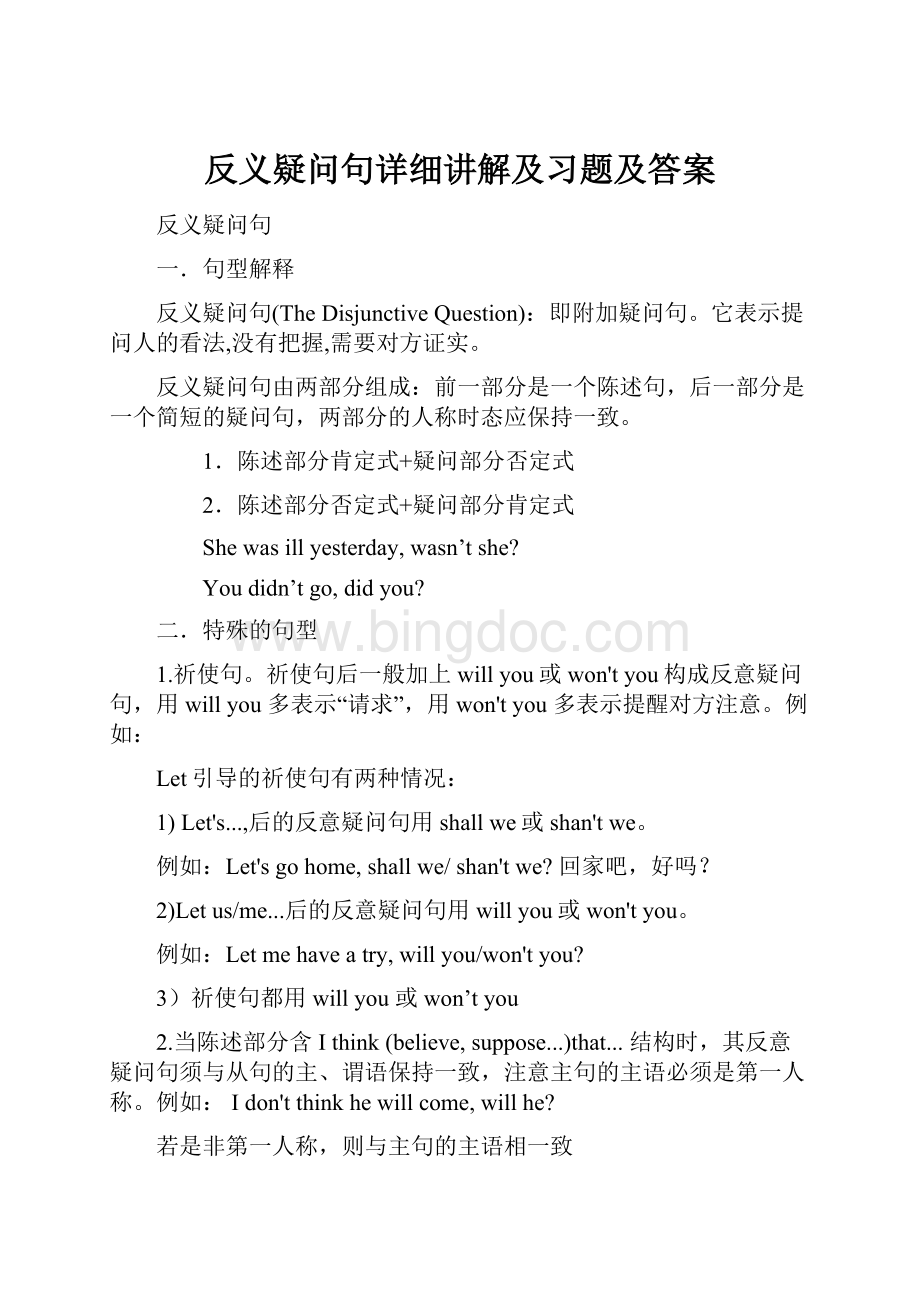 反义疑问句详细讲解及习题及答案.docx
反义疑问句详细讲解及习题及答案.docx
- 文档编号:5985335
- 上传时间:2023-05-09
- 格式:DOCX
- 页数:21
- 大小:26.44KB
反义疑问句详细讲解及习题及答案.docx
《反义疑问句详细讲解及习题及答案.docx》由会员分享,可在线阅读,更多相关《反义疑问句详细讲解及习题及答案.docx(21页珍藏版)》请在冰点文库上搜索。

反义疑问句详细讲解及习题及答案
反义疑问句
一.句型解释
反义疑问句(TheDisjunctiveQuestion):
即附加疑问句。
它表示提问人的看法,没有把握,需要对方证实。
反义疑问句由两部分组成:
前一部分是一个陈述句,后一部分是一个简短的疑问句,两部分的人称时态应保持一致。
1.陈述部分肯定式+疑问部分否定式
2.陈述部分否定式+疑问部分肯定式
Shewasillyesterday,wasn’tshe?
Youdidn’tgo,didyou?
二.特殊的句型
1.祈使句。
祈使句后一般加上willyou或won'tyou构成反意疑问句,用willyou多表示“请求”,用won'tyou多表示提醒对方注意。
例如:
Let引导的祈使句有两种情况:
1)Let's...,后的反意疑问句用shallwe或shan'twe。
例如:
Let'sgohome,shallwe/shan'twe?
回家吧,好吗?
2)Letus/me...后的反意疑问句用willyou或won'tyou。
例如:
Letmehaveatry,willyou/won'tyou?
3)祈使句都用willyou或won’tyou
2.当陈述部分含Ithink(believe,suppose...)that...结构时,其反意疑问句须与从句的主、谓语保持一致,注意主句的主语必须是第一人称。
例如:
Idon'tthinkhewillcome,willhe?
若是非第一人称,则与主句的主语相一致
Hethinksthatshewillcome,doesn’the?
反意疑问句的陈述部分为I(We)don’tthink(believe,suppose,consider)+that从句时,从句为否定意义,问句部分的动词和主语仍与that从句保持一致且用肯定式。
如:
①Idon’tthinkthatyoucandoit,canyou?
(不用doI?
)
②Wedon’tbelievethatthenewsistrue,isit?
(不用dowe?
)
反意疑问句的陈述部分为主语+said(told,reported,asked……)+that从句时,问句部分的动词和主语与陈述部分的主句动词和主语保持一致。
如:
①Theysaidthatyouhadfinishedyourwork,didn’tthey?
(不用hadn’tyou)
②Katetoldyouthatshewouldgothere,didn’tshe?
(不用wouldn’tshe?
)
3.当反意疑问句的陈述部分为从句时,若主句主语为I,反意部分的主语为从句主语;若不为I,反义部分的主语为主句主语。
①Iknowyourfatherisaworker,isn'the?
①sheknowsyourfatherisaworker,doesn’tshe?
4.当陈述部分含有以下这些含有否定意义的词时:
few,little,seldom,hardly,never,not,no,noone,nobody,nothing,none,neither等,其反意疑问句需用肯定结构。
例如:
Heisneverlateforschool,ishe?
5.当陈述部分所含的否定词是通过加前缀或后缀构成的,其后的反意疑问句依然用否定结构。
例如:
Itisunfair,isn'tit?
这不公平,是吧?
6.陈述部分主、谓语是Iam...时,反意疑问句用aren'tI,而不是amnotI(可用amInot)。
例如:
I'mworkingnow,aren'tI?
我在工作,是吗?
7.陈述部分的主语是everybody,everyone,anybody,anyone,somebody,someone,nobody,noone,none,neither时,其反意疑问句的主语需用复数代词they。
例如:
Everyoneishere,aren'tthey?
大家都到了,是吗?
Nooneknowsaboutit,dothey?
没有人知道这件事,对吗?
8.陈述部分的主语是everything,nothing,anything或something时,反意疑问句的主语应用代词it。
例如:
Somethingiswrongwithmyradio,isn'tit?
我的收音机出毛病了,是吧?
9.陈述部分的主语是指示代词this或that时,反意疑问句的主语用it,当陈述部分的主语是指示代词these或those时,其反意疑问句的主语用they。
例如:
Thisisaplane,isn'tit?
这是一架飞机,是吗?
Thesearegrapes,aren'tthey?
这些是葡萄,是吗?
10.陈述部分的主语是不定代词one时,反意疑问句的主语可以用one,也可用you。
例如:
Oneshouldbereadytohelpothers,shouldn'tone?
每个人都应该乐于助人,是吧?
11.当陈述部分谓语动词是need,dare,且这些词被用作实义动词时,其反意疑问句需用do的适当形式。
例如:
Heneedshelp,doesn'the?
他需要帮助,是吗?
12.当陈述部分主语是从句、不定式(短语)、动词-ing形式时,反意疑问句的主语应该用it。
例如:
Whatyouneedismoreimportant,isn'tit?
你需要的东西更重要,是吧?
12.have(has)不是表示“有”的意思,并在句中做谓语时,其反意疑问句的助动词要用do,does,did。
例如:
Theyhadameetingjustnow,didn'tthey?
他们刚才开了个会,是吗?
15.陈述部分有haveto时,其反意疑问句要用助动词的否定形式。
例如:
Youhavetowaterthevegetableseveryday,don'tyou?
Youhadtowaterthevegetableseveryday,didn'tyou?
16.Heusedtostayuplate,usedn’the/didn’the?
17.陈述部分是therebe句型时,其反意疑问句中要用there。
Therewasahospitalhere,wasn'tthere?
18.陈述部分有hadbetter时,反意疑问句中要用hadn't。
例如:
We’dbettergotoschoolatonce,hadn'twe?
He’drathergohome,wouldn’the?
19.当陈述部分含有情态动词must时,我们便要分析一下must的含义。
如果must作“一定;要;必须”讲,反意疑问句须用mustn't或needn't;而当must作推测意义“一定是;必定”讲时,反意疑问句则需根据must后的动词原形选用相应的形式。
例如:
Hemustworkhardatphysics,mustn'the?
他必须努力学物理,是吧?
Tommustbeathome,isn'the?
汤姆一定在家,是吧
①Hemighthaveforgottenhispenintheclassroomyesterday,didn’the?
(不用mightn’the?
/hasn’the?
)
②Youmusthavegotuplatethismorning,didn’tyou?
(不用mustn’tyou?
/haven’tyou?
)
20.反意疑问句的回答用yes,no,但是,回答意思相反,当陈述部分是否定形式时,回答要按事实。
例如:
Theydon’tworkhard,dothey?
Yes,theydo.不,他们工作努力。
/No,theydon’t.对,他们工作不努力。
反意疑问句的陈述部分为Iam……时,问句部分习惯上用aren’tI?
表示。
如:
Iamaveryhonestman,aren’tI?
反意疑问句二
反意疑问句是英语四大问句之一,它是由一个陈述句加上一个短问句而构成的。
反意疑问句的基本构成形式是:
陈述句+动词(肯定或否定)+主语?
如:
①Sheoftenhaslunchatschool,doesn’tshe?
②Youdon’tlikesports,doyou?
一、 反意疑问句中问句部分的动词与陈述部分的动词在语气上成相反的对应关系,即:
肯定+否定?
否定+肯定?
如:
①Youcan’tdoit,canyou?
②Theyareverylateforthemeeting,aren’tthey?
二、反意疑问句中问句部分的动词与陈述部分的动词种类要对应一致。
如:
①Hehassupperathomeeveryday,doesn’the?
(不能用hasn’the?
)
②Theyhaveknownthematter,haven’tthey?
(不能用don’tthey?
)
三、反意疑问句中问句部分的动词在时态上应和陈述部分的时态一致。
如:
①Theywillgototownsoon,won’tthey?
(不能用don’tthey?
或aren’tthey?
)
②Heworksveryhard,doesn’the?
(不能用didn’the?
或won’the?
)
四、反意疑问句的陈述部分带有little,few,never,hardly,seldom等否定意义的词时,问句部分用肯定式。
如:
①Shenevertellsalie,doesshe?
(不用doesn’tshe?
)
②Hewasseldomlate,washe?
(不用wasn’the?
)
五、反意疑问句的陈述部分含有由un-,im-,in-,dis-,等否定意义的前缀构成的词语时,陈述部分要视为肯定含义,问句部分用否定形式。
如:
①Yourfatherisunhappy,isn’the?
(不能用ishe?
)
②Themanisdishonest,isn’the?
(不能用ishe?
)
六、反意疑问句的陈述部分为Iam……时,问句部分习惯上用aren’tI?
表示。
如:
Iamaveryhonestman,aren’tI?
八、反意疑问句的陈述部分为I(We)don’tthink(believe,suppose,consider)+that从句时,从句为否定意义,问句部分的动词和主语仍与that从句保持一致且用肯定式。
如:
①Idon’tthinkthatyoucandoit,canyou?
(不用doI?
)
②Wedon’tbelievethatthenewsistrue,isit?
(不用dowe?
)
九、反意疑问句的陈述部分为非第一人称主语+think(believe,suppose,consider)+that从句时,问句部分的动词和主语与陈述部分的主句动词和主语保持一致。
如:
①TheyallthinkthatEnglishisveryimportant,don’tthey?
(不用isn’tit?
)
②Hedidn’tthinkthatthenewswastrue,didhe?
(不用wasn’t/wasit?
)
十、反意疑问句的陈述部分为主语+said(told,reported,asked……)+that从句时,问句部分的动词和主语与陈述部分的主句动词和主语保持一致。
如:
①Theysaidthatyouhadfinishedyourwork,didn’tthey?
(不用hadn’tyou)
②Katetoldyouthatshewouldgothere,didn’tshe?
(不用wouldn’tshe?
)
十一、陈述部分的主语为不定代词something,anything,nothing,everything时,问句部分的主语用it。
如:
①Somethingiswrongwiththecomputer,isn’tit?
②Nothinghashappenedtothem,hasit?
十二、陈述部分的主语为不定代词somebody(someone),anybody(anyone),nobody(noone),everybody(everyone)时,问句部分的主语用he或they,这时问句动词的数应和he或they一致。
如:
①Someonehastakentheseat,hasn’the?
②Everyonehasdonetheirbestinthegame,haven’tthey?
十三、陈述部分为Letme……时,问句部分习惯上用shallI?
或willyou?
形式。
如:
Letmehaveatry,shallI?
(willyou?
)
十四、陈述部分为Letus……时,问句部分习惯上用willyou?
陈述部分为Let’s……时,问句部分习惯上用shallwe?
如:
Letusstoptorest,willyou?
Let’sgohometogether,shallwe?
十六、陈述部分用上述情况以外的祈使句时,问句部分一般用willyou?
形式表示请求,用won’tyou?
形式表示委婉请求或邀请。
如:
①Dositdown,won’tyou?
/willyou?
②Jim,youfeedthebirdtoday,willyou?
③Pleaseopenthewindow,willyou?
(won’tyou?
)
十七、陈述部分为否定祈使句时,问句部分一般用willyou?
如:
Don’tmakeanynoise,willyou?
十八、陈述部分为There(Here)+be+主语时,问句部分用动词+there(here)?
。
如:
①Therearetwocakesontheplate,aren’tthere?
②HereisastoryaboutMarkTwain,isn’there?
十九、陈述部分用hadbetter+原形动词表示建议时,问句部分用hadn’t+主语?
。
①You’dbettertellhimaboutthematter,hadn’tyou?
②Wehadbetterdoitbyourselves,hadn’twe?
二十、陈述部分用usedto+主语时,问句部分用didn’t+主语?
或usedn’t
①Heusedtoliveinthecountry,didn’the?
/usedn’the?
②Theyusedtobegoodfriends,didn’tthey?
/usedn’tthey?
二十一、陈述部分用must(may,might)+have+V-ed表示推测时,若句中带有明显的过去时间的状语,问句部分动词用过去时形式。
如:
①Hemighthaveforgottenhispenintheclassroomyesterday,didn’the?
(不用mightn’the?
/hasn’the?
)
②Youmusthavegotuplatethismorning,didn’tyou?
(不用mustn’tyou?
/haven’tyou?
)
二十二、陈述部分用must(may,might)+have+V-ed表示推测时,若句中没有带明显的过去时间的状语,问句部分动词用现在完成时形式。
如:
①Everyonemusthaveknownthedeathofthewaitress,haven’tthey?
(不用mustn’tthey?
)
②Youmusthaveworkedthereayearago,didn’tyou?
(不用mustn’tyou?
/haven’tyou?
)
二十三、陈述部分的主语为从句时,问句部分的主语一般用it代替,如:
①Whathesaidistrue,isn'tit?
(不用didn’the?
)
②Wherewewillbuildthedamhasnotbeendecidedyet,hasit?
(不用won’twe?
)
二十四、陈述部分的主语为动名词或不定式时,问句的主语用it代替。
如:
①Todoonegooddeediseasyforaperson,isn'tit?
②Skatingisyourfavoritesport,isn'tit?
反意疑问句考点
反意疑问句是高考重要考点,其构成形式是"肯定+否定"和"否定+肯定",但也有一些特例。
本文结合高考试题,对反意疑问句的易考点进行归纳。
1.陈述句部分的谓语是be,hadbetter或情态动词等时,反意疑问句仍用这些动词。
[原题再现]
Bill'saimistoinformtheviewersthatcigaretteadvertisingonTVisillegal,________?
A.isn'titB.isitC.isn'theD.ishe
答案:
A
2.陈述部分的谓语是have时,若have作"有"解,反意疑问部分用have(has)或do(does)的肯定或否定式;若have作使役动词,则只能用do(does,did)的适当形式进行反问。
[原题再现]
Hiswifehadthefrontdoorpaintedgreenyesterday,________she?
A.didB.hadC.didn'tD.hadn't
答案:
C
3.陈述部分含有no,never,seldom,hardly,few,little,nowhere,nothing等否定意义的词时,反意疑问部分用肯定形式;但陈述部分若使用含有否定意义的前缀或后缀的词时,反意疑问部分仍然使用否定形式。
[原题再现]
Heseldomhaslunchatschool,________?
A.hasn'theB.hasheC.doesn'theD.doeshe
答案:
D
TheydislikeEnglish,don'tthey?
他们不喜欢英语,不是吗?
4、含有下列情态动词时构成的反意疑问句形式
a、陈述句有hadbetter时,问句中用had(hadn’t)。
You’dbettergohomenow,hadn’tyou?
b、陈述句中有must表示“必须”时问句用needn't或mustn't
Youmustdoyourhomework,mustn'tyou?
/needn'tyou?
Wemustn’tgohome,must(need)we?
c、must表示“推测”时,问句中则不能用情态动词,而需要用其它形式。
如:
Shemustbeintheroom,isn’tshe?
YoumusthavebeentoShanghai,haven’tyou?
[原题再现]
Thereisnolightinthedormitory.Theymusthavegonetothelecture,________?
A.didn'ttheyB.don'ttheyC.mustn'ttheyD.haven'tthey
答案:
D
5.陈述部分的主语是everyone,everybody,anyone,anybody,someone,noone等不定代词时,其疑问部分的主语可根据句子的内涵选用he或they。
例如:
Everyoneknowshisjob,doesn'the?
Everyonehadlentyouahandwhenyouwereintrouble,hadn'tthey?
6.陈述部分的主语是something,anything,everything,nothing等不定代词,其疑问部分的主语一般用it。
例如:
Everythingisready,isn'tit?
Nothinggoeswell,doesit?
7.陈述部分是therebe句型时,反意疑问部分用"...there?
"。
[原题再现]
There'snotmuchnewsintoday'spaper,________?
A.isn'titB.arethere
C.isthereD.aren'tthere
答案:
C
8.陈述部分谓语含有usedto时,反意疑问部分可用usedn't,也可用didn't;陈述部分含有oughtto时,反意疑问部分可用oughtn't或shouldn't两种形式。
例如:
TomusedtomakefunofPeter,usedn't/didn'the?
Weoughttolearnthelawknowledgebyheart,oughtn't/shouldn'twe?
9.陈述部分的主语是this,that,不定式短语、动名词短语或从句时,反意疑问部分的主语用it;陈述部分的主语是these,those时,反意疑问部分的主语用they。
例如:
Thisisamostwonderfulplace,isn'tit?
Learningaforeignlanguagewelltakesalongtime,doesn'tit?
Thattheyareclosefriendsdoesn'tseemtrue,doesit?
10.陈述部分的主语后有同位语从句或定语从句修饰时,反意疑问部分仍应对主句主语进行反问。
[原题再现]
Thenewsthat
- 配套讲稿:
如PPT文件的首页显示word图标,表示该PPT已包含配套word讲稿。双击word图标可打开word文档。
- 特殊限制:
部分文档作品中含有的国旗、国徽等图片,仅作为作品整体效果示例展示,禁止商用。设计者仅对作品中独创性部分享有著作权。
- 关 键 词:
- 反义 疑问句 详细 讲解 习题 答案
 冰点文库所有资源均是用户自行上传分享,仅供网友学习交流,未经上传用户书面授权,请勿作他用。
冰点文库所有资源均是用户自行上传分享,仅供网友学习交流,未经上传用户书面授权,请勿作他用。


 《安全在我心中生命在我手中》主题班会教案.docx
《安全在我心中生命在我手中》主题班会教案.docx
